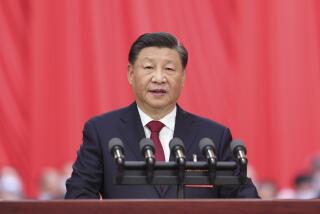New Economic Motto Is Puzzling to the Chinese : Commerce: Citizens don’t know what their leadership’s policy, ‘socialist market economy,’ really means.
- Share via
BEIJING — There is one nagging problem with the slogan dreamed up by China’s Marxist leaders to describe their new economic platform--nobody knows what it means.
“Socialist market economy” could mean anything.
The phrase was carved into the official doctrine of the Chinese Communist Party at its 14th Congress last week. It is supposed to point to a new future for China mapped out by 88-year-old paramount leader Deng Xiaoping that mixes capitalist markets with socialist-style planning.
How China will juggle markets with Marxism is anybody’s guess.
Economic reformers are expected to be promoted after the Congress, and although they will not take the top jobs, their influence could be decisive, many diplomats believe.
During his keynote speech, party leader Jiang Zemin suggested that the idea was for the government, which for four decades has set everything from train timetables to factory output quotas, to take a back seat.
“We must continue to intensify the market forces,” he said. But Jiang quickly added, without giving details: “We should guide the growth of the market by economic policies, regulations, planning and necessary administrative means.”
The first challenge, as the economy surges again, will be to rein in the growth of money supply, the fuel for inflation that regularly turns China’s economic booms to bust. It will be an important test of Deng’s new plan in action.
China apparently has put its faith in monetary levers such as interest rates.
Last Tuesday the Deputy Governor of the People’s Bank of China, Chen Yuan, said that China would use flexible interest rates to “better adjust monetary supply and demand.”
Western economists are skeptical that this can work. They point to the single greatest problem of the Chinese economy-- subsidies to inefficient state-run industries that are bloating an already huge budget deficit.
Many believe that the only solution is a radical restructuring of state-owned industry.
Nowhere is the muddle about China’s economic future more evident than in policy toward the public sector.
Jiang declared that government-run industry would remain the core of the “socialist market economy,” with private enterprise playing a mere supportive role. But he also said that through pricing and competition “efficient (enterprises) will prosper and the inefficient ones will be eliminated.”
Without subsidies, most government-owned factories would go bust.
Almost half of China’s industrial production now comes from the non-state sector, and the proportion is rising fast. The foreign-invested export factories of southern China have been the star performers of the current boom.
Across China, the lines between the state and private economy are blurring. State-owned companies are listed on the country’s two stock markets in Shenzhen and Shanghai.
Large parts of the south China coast have simply ignored Beijing and gone their own way, setting the pace for market-driven changes. Since they pay for their own development, central government has little control.
Under the “socialist market economy,” provinces like Guangdong, across the border from Hong Kong, have officially been given the green light to leap ahead. They may well define what the new slogan means in practice.
More to Read
Sign up for Essential California
The most important California stories and recommendations in your inbox every morning.
You may occasionally receive promotional content from the Los Angeles Times.













